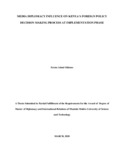Please use this identifier to cite or link to this item:
http://ir-library.mmust.ac.ke:8080/xmlui/handle/123456789/1382| Title: | MEDIADIPLOMACYINFLUENCEON KENYA’S FOREIGN POLICYDECISION MAKING PROCESSAT IMPLEMENTATION PHASE |
| Authors: | Odiemo, Festus Aduol |
| Keywords: | Media, Diplomacy, Influence, Foreign Policy, Decesion Making |
| Issue Date: | Mar-2020 |
| Publisher: | MMUST |
| Abstract: | The media's diplomatic function has been studied in relation to the advancedcommunication technologies that have led to the allocation of a more far-reaching roleto the media in the conduct of diplomacy.The main research gap that this study aims at covering lies in the actual media diplomacy influence on the foreign policy decision making process. Despite the attention given to the media's potential to affectforeign policy decisions, their involvement is still confined to a largely instrumental role and more importantly, one that influences the process of decision making, rather than the decision outcomes.This studyanalysedmedia diplomacy influence on foreign policy decision making process in Kenyaat implementation phase. The generalobjective of this research wasto evaluatethe role of mediadiplomacyinfluencingforeign policy decision making process in Kenya. As a case study, this research set out todeterminethe role and impact of media diplomacy in shaping foreign policy outcome in Kenya. This studyappliedTheory of Decision Making and Liberalism Theory to analyse the link between the media and foreign policy as the study relates the liberal values informing the foreign policy objectives of many countries. The liberalismtheory argues that people prefer peace to war. Public opinion is facilitated by the media and hence the media is important in policy decision making. Additionally, as the maintool of communication, media is crucial in projecting the values of a given country internationally. This study thereforeanalysedthe role of media in projecting Kenya’s values. This researchfocusedon Kenya’s application of the media in foreign policycomplementary role to diplomacy in foreign policy implementation strategy. The study employedhistorical and explorative research designs and utilize both quantitative and qualitative approaches.The data werecollectedat the ministry of foreign affairs as well as selected foreign diplomatic missions based in Nairobi. Itwasaimed at establishing whether themedia plays a complementary role to diplomacy in foreignpolicy decision making processand in shapingthe outcome of foreign policy in Kenya. The target population includedgovernment officials from the Ministry of Foreign affairs, and officials fromselected foreign diplomatic missions. The research instruments includedquestionnaires, interviews and document analysis from relevant publications. Data analysis wasdone using selected qualitative and descriptive statistical techniques, that is, it wasdone using SPSS software to obtain descriptive statistics particularly frequencies and percentages; excel spread sheets to obtain graphs and charts and chi square to show the associations among variables and for inferential analysis.Secondary data were analyzed through content analysis where relevant information wassifted through noting patterns of issues that relate to the subject matter.Data presentation wasdone using table, graphs, and charts. The findings of this study have bothacademicand policyimplications to the governmentin addressing the complex nature of media diplomacy in influencing foreign policy decision making in Kenya.It is established that media plays a complementary role to diplomacy in foreign policy implementation and hence shapes the outcome of foreign policy in Kenya. The study concludes that media diplomacy can play a significant role in the foreign policy implementation. The study hence recommends that Kenya should establish a strong regional medianetwork, an effective diplomaticstrategy to bridge the gaps in foreign policy process andtrain diplomats on effective media relations. The study further recommends research into the new media impact on diplomatic engagements and an inquiry into the effective ways of strategic requirements needed to integrate media diplomacy as a tool of foreign policy implementation by government. |
| URI: | http://r-library.mmust.ac.ke/123456789/1382 |
| Appears in Collections: | School of Disaster Management and Humanitarian Assistance |
Files in This Item:
| File | Description | Size | Format | |
|---|---|---|---|---|
| Festus Thesis.pdf | 2.16 MB | Adobe PDF |  View/Open |
Items in DSpace are protected by copyright, with all rights reserved, unless otherwise indicated.
